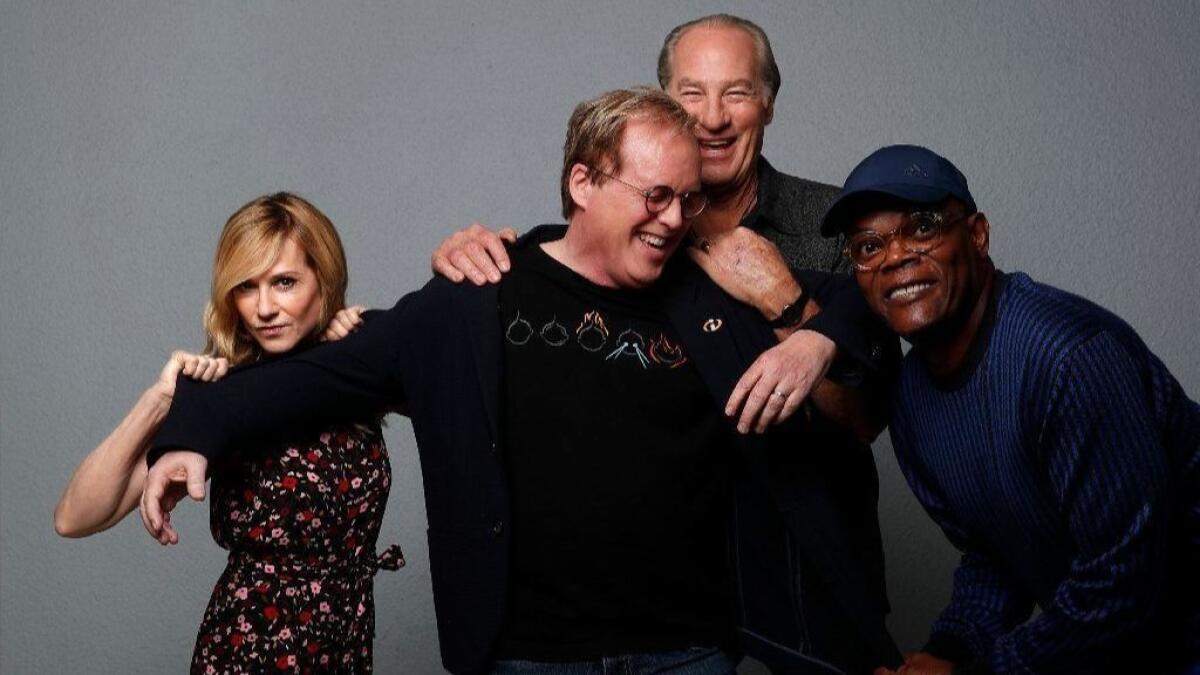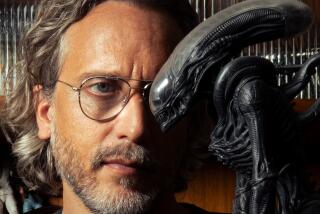How the stars re-aligned for ‘Incredibles 2,’ a sequel audiences actually want to see
The buzz was enthusiastic verging on ecstatic. The tracking suggested a potentially record-breaking opening. But just days before the release of the long-awaited Pixar superhero sequel “Incredibles 2,” writer-director Brad Bird was feeling less incredible than simply relieved.
“Before I made films, I thought these moments would be like gleeful leaping from room to room or something,” Bird said last week, seated on a couch in a West Hollywood suite beside the film’s voice stars, Craig T. Nelson, Holly Hunter and Samuel L. Jackson. “But all you feel is, ‘Thank God I didn’t bone it.’ That’s really it.”
Fourteen years after the original “Incredibles” grossed $633 million worldwide and earned the Oscar for animated feature, the film’s fans are finally getting the sequel they have long craved — and at times doubted would ever come.
In “Incredibles 2,” in theaters Friday, the all-too-human superheroes — parents Bob Parr/Mr. Incredible (Nelson) and Helen Parr/Elastigirl (Hunter), their three children and their stalwart friend Lucius Best/Frozone (Jackson) — return to battle evil once again, as if not a minute has gone by.
This time, Elastigirl charges boldly into the fray while Mr. Incredible stays home, to his frequent exasperation, with kids Violet, Dash and baby Jack-Jack.
The Times spoke with Bird, Hunter, Nelson and Jackson — who share an easy rapport despite almost never having worked together at the same time — about the long road to the sequel, the joys and challenges of doing voice work and how “Incredibles 2” might resonate in the era of #MeToo and a movie landscape increasingly awash with superheroes.

First of all, how many times have the four of you actually been in the same room together?
Bird: Only a handful of times.
Jackson: Craig and I were in the studio together once for the first movie. That was the only time we did that. That’s when Brad realized, “Those guys working together is not good. It takes too much time and they’re having too much fun with each other.”
Nelson: They actually separated us. They put a screen between us.
Bird: Well, they talked about golf a lot. [laughs]
The rapport between the characters is so strong, it’s surprising that you haven’t recorded together more.
Hunter: I think there’s just a vocal compatibility that Brad heard.
Bird: All of these guys are just great vocal actors as well as being great screen actors. They’ve all played many different roles, but there’s a certain something they bring that’s specific to them that I really wanted for these characters.
I remember reading an interview with another director and they were saying, “If you write a character for someone specific, it never works out. No one you want is going to say yes and then you’re hosed.” But these are the people I heard in my head — and I asked and they said yes. I got lucky.
Craig, Sam and Holly, what did you all expect heading into the first “Incredibles?” Had any of you done any voice work in animation before?
Nelson: I hadn’t. I didn’t know what it was. I had seen [Bird’s 1999 animated film] “The Iron Giant” and loved it, and I was I thinking, “Boy it would be great to get to do a voice.” And then this came along.
The beauty of doing it was that it was just such a brand new experience. For me, it was such a challenge because all of the externals are removed: the other characters, that kind of response that you do physically. So it was learning a new craft. It was fun but was very challenging.
Jackson: I watched cartoons all my life, and when I was a kid, we’d repeat the dialogue of some of those Daffy Duck and Road Runner and Yosemite Sam and Donald Duck cartoons we’d seen a million times.
Then all of the sudden with “The Incredibles,” we’re in a situation where — yes, it’s a cartoon, but it’s not a cartoon character voice. It’s your voice being a real character in a real film that’s about something that’s genuine in that particular world. You give it a characterization through your voice.
Hunter: When I see the movie, Elastigirl is not my creation — she is something unto herself. The animators have such imagination, it’s a whole other creation that in some ways has nothing to do with me. And I especially felt that in this movie. The animation is so incredible and so sophisticated that, as an audience member, I was closer to her than I’d ever been.
For years, a lot of fans wondered if this movie would ever get made. But Sam, you seem to have always had faith. You’d periodically give interviews where you’d say, “It’s going to happen.”
Jackson: [shrugs] Yeah, of course. Brad never said, “It’s never gonna happen,” so…
Nelson: Sam got me all excited about it. We were playing golf at the AT&T Pebble Beach [Pro-Am Tournament] — this was like four or five years after we’d done the first one — and Sam said, “Did you hear we’re doing another one?” And I’m just about getting ready to cash that check, you know? [laughs]
Bird: And every time I ran into Sam, he’d be like, “All right, when is this happening?”
Jackson: For years, it was like, “When is ‘Incredibles 2?’ When is ‘Incredibles 2’? When is ‘Incredibles 2’?” Every week for the last 14 years, as long as I’ve been on social media, that’s been the question. I said to Brad, “Are you through messing around with those other people yet? Come back to us — we need you.”
When the first “Incredibles” came out, there were really only two active superhero franchises: Spider-Man and the X-Men. But in the years since, the genre has exploded to the point that this is the fourth major superhero movie this year alone.
Hunter: Gosh, I can’t imagine.
What’s your feeling when you see the extent to which comic-book movies have come to dominate the studio system?
Bird: Well, Hollywood has a long tradition of beating successful things to death. If you go back to the late ’50s, every other TV show was a Western. That’s just what Hollywood does. That said, while Westerns were getting way overdone, some of the best Westerns were made during that period: “The Searchers,” “The Man Who Shot Liberty Valance,” “Ride the High Country.”
I think [comic-book films] are taking up too much of the bandwidth of movies. But there are films like “Logan” and “Wonder Woman” and “Black Panther” that are worth seeing and are doing something. It’s all down to the storytellers, I think.
Jackson: Hollywood has always been Hollywood. When I was a kid, I saw double features on the weekend of all sorts of stuff: Westerns, pirate films, “Robin Hood,” Abbot and Costello, horror movies. But the genres haven’t changed that much. It’s about the stories.
I can compare almost every movie that’s out there to something I’ve seen before. I don’t care about that. I just hope they made a great story out of it.
There’s no way you could have anticipated where the zeitgeist would be when you were working on the movie, but the story’s female-empowerment aspect feels very timely. How do you think that’ll resonate with audiences?
Hunter: Well, to me, this doesn’t feel like a message movie in any way, but with Time’s Up and #MeToo and these movements that are happening now, obviously it is not a bad thing for people to have these things expressed as completely and as specifically as they are in this movie. I love the role reversal [between Elastigirl and Mr. Incredible]. It is great for people to see that.
Bird: Hopefully you make things for 100 years from now. You’re not trying to serve the zeitgeist of the moment. You’re trying to get into something that’s more eternal.
Elastigirl is still the same character as in the first movie — she’s not a different person because of what’s changing around society now. The goal was really to bring out a somewhat dormant side of her and to also throw Bob into a really uncomfortable position just because it’s entertaining. And dads are important. Not enough people talk about the importance of dads stepping up.
Hunter: I hate the term “Mr. Mom.” That drives me insane. It’s so diminishing. A father staying at home and raising children — this movie expresses just how enormous of a task it is. It’s heroic.
Nelson: [dryly] It’s really difficult if you’re a certain kind of person.
At one point in this movie, the villain, the Screenslaver, delivers a monologue about how we’ve become too addicted to our screens and are too easily manipulated. You can’t help thinking, “Well, he has a point.”
Bird: For better or worse, I always feel like the villain should believe in the villain’s stance. It may be wrong but it should make sense in a way. The villain shouldn’t just go, “Mwah-hah-hah! I will be evil to be evil!” They should have a point of view that they’ve thought about.
Hunter: [to Bird] So if you think all villains have to have an ethos, do you agree with the villain in this?
Bird: In some ways, sure. But that doesn’t mean that I agree that we should poison everyone’s lives in order to make things right.
Jackson: It’s totally valid to bring up in a film because people are totally locked into [their screens]. I was talking to my daughter the other day and I said, “When I call and you don’t answer the phone—” And she says, “You have to text me and let me know that you’re calling.” I’m like, what are you talking about? You’re using the phone anyway!
In all these years of hearing from fans, what’s your sense of why people have connected so deeply to this franchise?
Bird: I think it’s the architecture of the family. And family doesn’t just mean biological — it can be anyone that has your back. The family can argue with each other but when push comes to shove they face outward and circle the wagons. I think that’s reassuring.
This movie hasn’t even come out yet, but looking ahead, do you have a sense of where you might like to see this franchise go from here?
Jackson: [deadpan] Well, I only have like a six-picture deal and I don’t know if I’m going to be alive that long. I’m worried about that.
Bird: For me, it’s just a pleasure to work with artists of this caliber. One of the best things about moviemaking is that you get to work with people who have widely divergent talents but they’re all at a really crazy level. It’s just a delight.
That’s the pinch-me part. That’s the part of filmmaking that I’d do for free. It’s the B.S. that I charge for — and they can’t pay me enough for that.
Jackson: [nodding] True that.
This interview has been condensed and edited.
ALSO
REVIEW: ‘Incredibles 2’ is the superhero family saga we need right now
Brad Bird on the 14 year journey to ‘Incredibles 2’
Pixar’s ‘Incredibles 2’ is poised for huge box office opening. Can it set an animation record?
Twitter: @joshrottenberg
More to Read
Only good movies
Get the Indie Focus newsletter, Mark Olsen's weekly guide to the world of cinema.
You may occasionally receive promotional content from the Los Angeles Times.











